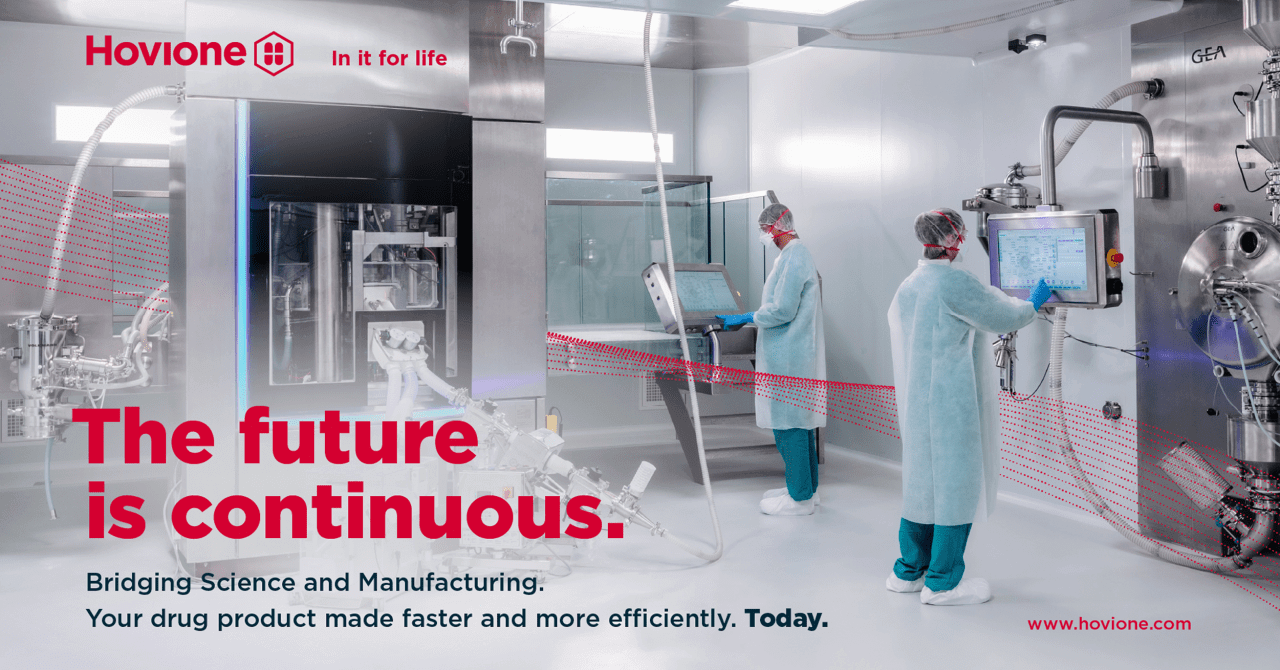Lisbon, 6th September 2022 – Hovione, the leader in spray drying and particle engineering, announced today that it has expanded its continuous manufacturing offering and services. A new state-of-the-art continuous manufacturing facility is now coming online at the Loures site in Portugal. In addition, to support Hovione’s commitment to providing access and services for continuous tableting, Hovione has further strengthened its capabilities by establishing a highly experienced multi-disciplinary global team in continuous tableting and upgrading its labs with the tools needed to support the drug product lifecycle, thereby further guaranteeing competency and capacity from research & development to commercial production.
Continuous manufacturing is expected to change the landscape of drug product development and commercial production. The Food and Drug Administration (FDA) is partnering with the International Council for Harmonization and leading a global initiative to advance continuous manufacturing of small molecules and other pharmaceutical modalities.
Hovione is offering customers a commercial continuous tableting platform prepared to support key control needs and deliver on operational excellence, mechanistic modeling, and appropriate process analytical technology (PAT). Additionally, Hovione´s quality system has been designed to support the release of continuous tableting products through automated in-process controls, deployment of real time release, and compliant digital infrastructure.
This cutting-edge technology offers a distinct set of features and advantages including faster development of simpler processes, agile manufacturing for variable demand, robust control strategies and high process quality standards.
“Hovione has been historically focused on innovative technologies that benefit our customers and patients. With this investment in continuous tableting, our customers can rely on our support to bring much needed medicines to the market as fast as possible with the highest quality and manufacturing standards.”, comments Jean-Luc Herbeaux, Hovione´s CEO. “We are investing to accelerate the adoption of this technology as we continue to innovate and enhance our offering around our areas of expertise.”
“This investment in continuous tableting from R&D to production further strengthens Hovione´s CDMO offering and responds to the growing customer interest.” says Filipe Neves, Hovione´s Strategic Business Director.
This latest investment in Continuous Tableting is part of Hovione´s broader strategy to build differentiated and enabling capabilities and assets to meet customers unique needs for oral dosage forms manufacturing.
About Hovione: Hovione is an international company with over 60 years of experience as a Contract Development and Manufacturing Organization (CDMO) with a fully integrated offering of services for drug substance, drug product intermediate and drug product. The company has four FDA inspected sites in the USA, Portugal, Ireland and China and development laboratories in Lisbon, Portugal and New Jersey, USA. Hovione provides pharmaceutical customers services for the development and compliant manufacture of innovative drugs, including highly potent compounds, and customized product solution across the entire drug life cycle. In the inhalation area, Hovione offers a complete range of services, from API, formulation development and devices. Hovione´s culture is based on innovation, quality and delivery. Hovione was the first Chemical/ Pharmaceutical Company to become a Certified B Corp, is a member of Rx-360, EFCG and participates actively in industry quality improvement initiatives to lead new global industry standards.


